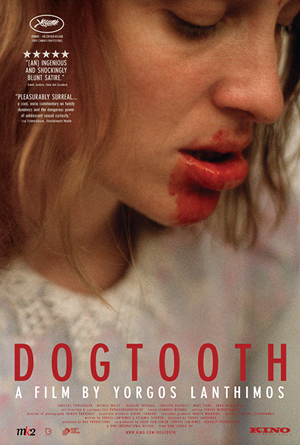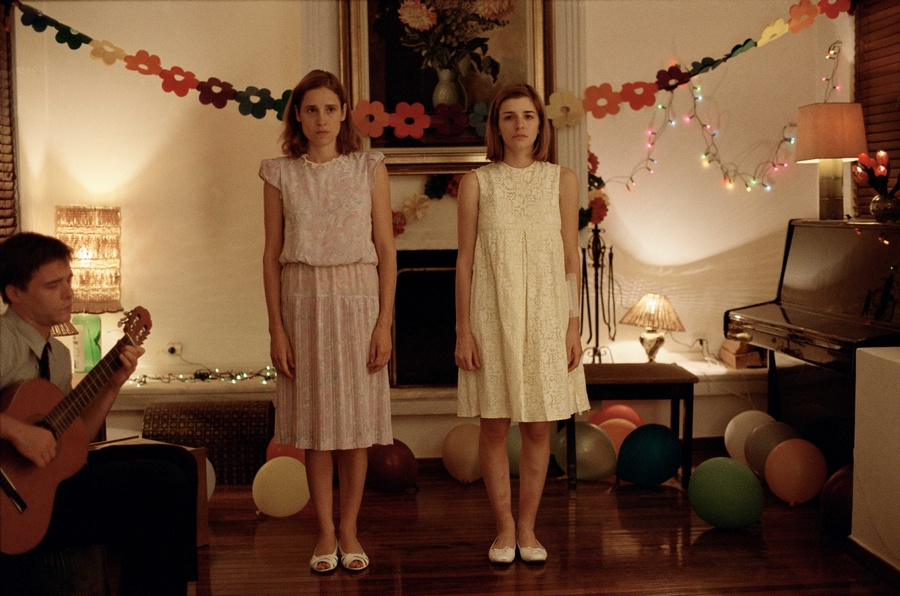Starring Aggeliki Papoulia, Hristos Passalis, Mary Soni,
Christos Stergioglou
For whatever reason, awful parenting is a familiar theme in
many films. However, as bad as some film parents may be, rarely does it end up in the odd and dark places that Greek
filmmaker Giorgos Lanthimos takes us in Dogtooth. Its oddness became apparent from the quick
description I got from my brother about a weird movie where the parents shelter
their (grown up) kids and teach them misguided vocabulary. But I was unprepared for just how odd this
family is and just how dark the physical and mental abuse inflicted on these
kids would be. That being said, it is still
an impressive piece of filmmaking that tells a completely unique story - a film
that one may feel a little disgusted for liking, but liking nonetheless. You just have to prepare yourself to be
challenged going in and it might be a rewarding experience.
We are all blank slates at birth. Throughout childhood (and beyond), we learn
from our experiences in the world to become the people we currently are. When imprisoned in the confines of one’s home
your entire life, the experiences that influence what fills a person’s "slate" is
vulnerable to the whims of whoever is in control. That is the situation the three nameless
(telltale sign that something is wrong with these people) children in Dogtooth’s family find themselves in.
It quickly becomes clear that these children have been cut
off from the outside world to be molded into their parents’ mindless
creations. From the film’s first shot,
the oddness of their parenting is undeniable.
The brother and two sisters listen to inaccurate vocabulary lessons that
define “sea” as a wooden armchair and “excursion” as a strong floorboard. These lessons are regular occurrences as one
realizes later in the film; such as a “telephone” being salt and “zombies” a small yellow flowers, to these kids. Pretty fucking weird,
right? However, the weirdness quickly
descends into outright disturbing territory.
These parents control every aspect of their children’s
lives. They define roles for each to
play in the family (one daughter is trained to be something of a family
physician), set up competitions for their affection, and brutally punish misbehavior. With their entire perception of the world
beyond the home predetermined by their draconian captors, these
poor people have no idea how terrible their situation is.
Yet during the course of the film, a seed is planted that
there is a different life outside the fence that may be better. Of course, it would be a life that their 20
plus years of familial imprisonment would leave them dangerously
unprepared for. Despite the father’s best
efforts to remain in control, it is the one aspect of the outside world he
brings in who is responsible for planting these seeds. In his sick control over his son’s sexuality,
he pays a woman to come to the house (blindfolded, of course) to satisfy his son’s needs. Yet this woman has not spent decades imprisoned within this house and has free will, which begins to "corrupt" the control one of the kids.
From this moment, Dogtooth
gets increasingly violent and increasingly disturbing (without losing its
regular oddness). As the kids unknowingly
enter a psychological chess match with their deranged parents, life in the
house gets more and more terrifying.
When the lies do not keep the children in line, violence will. These tactics work better on some of the
children than others.
The oddness and psychological horror I have described in Dogtooth cannot do it justice. For every strange oddity mentioned, there are
probably a dozen others. The strangest
being when an old Frank Sinatra record is “translated” as lesson from their
grandfather about the importance of loving Mom and Dad. All the more disturbing, Lanthimos never
allows the audience to get a glimpse of the reasoning behind the parents’
unorthodox (to put it nicely) and disgusting (to put it honestly) methods. Every action is a mystery, and remains a
mystery beyond the credits, which only heightens their villainy.
If this review has left you intrigued, despite its staunch art house
credentials (which many shy away from, unfortunately) and challenging subject
matter, I still feel obligated to provide further warning. Dogtooth
is a good film but very difficult to sit through. The physical, mental and sexual abuse endured
by these characters is blunt and horrifying.
Its violence is graphic (but never with a sense of “action movie” fun),
as is its nudity and sex scenes (but never with a sense of “erotic movie” fun). This is a brutal film with brutal
themes: mental abuse, incest, domestic
violence, rape, corporal punishment, self-mutilation.
Clearly, this is rough material. But if you are prepared for what is in store
and willing to endure a gut-punch of a movie, you will be rewarded with a work of
art unlike any you’ve ever seen. That
was my reaction to Dogtooth. I did not have a lot of fun while watching it
and am in no rush to see it again, but it is something I am definitely glad to
have seen. There’s a chance that you may
agree. And also a pretty good chance
that you will be horrified beyond belief and disgusted by my recommendation... but
you can’t say I didn’t warn you.
Mark it 6.





No comments:
Post a Comment